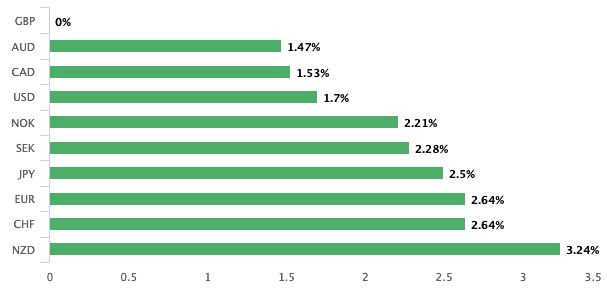Pound-to-Euro Exchange Rate up 1.0% this Week, Analysts Question Extent of Further Strength

Image © Adobe Images
Pound Sterling is the best performing major currency of the past month, and past week, but analysts continue to maintain a view that further strength might be limited in the current political environment.
Sterling has embarked on a recovery rally over recent days, during which it has hit its best exchange rate against the Euro since July, as foreign exchange markets reacted to developments in the UK parliament that meant a 'no deal' Brexit on October 31 would be increasingly unlikely.
The GBP/EUR exchange rate is today quoted at 1.1164, up 1.0% over the course of the past week. Over the course of the past month, the exchange rate is 4.0% higher, providing welcome relief to those looking to transfer money from Sterling into Euros.
The current bank market rate for international payments is in the 1.0870-1.0950 region, while independent payment providers are tighter on their spreads meaning rates around 1.11 could be achievable.
Of course, market participants will be increasingly willing to gauge whether or not they should sit back and await for further strength.
Our view remains that strength in Sterling is likely to remain fragile, owing to the overbearing political uncertainty facing the UK.
Yes, a 'no deal' Brexit might be delayed but it a General Election is now a certainty and the outcome of the vote is highly uncertain and therefore offers both significant upside, and downside to Sterling.
"GBP has gained some support from reduced risk of an imminent no-deal Brexit, but intensified uncertainty will dominate and cap gains for a continually volatile GBP," says Tim Riddell, at Westpac in London. "The intensity of uncertainty is evidenced this week in the deterioration of both manufacturing and service sector PMIs, which showed heightened risk of a Brexit-related recession. The firmness of the labour market also looks to be vulnerable."

Above: Sterling's recent recovery means it has gained against all its major peers over the course of the past month.
Foreign exchange markets are in all likelihood now going to focus on the looming General Election, with the House of Commons due to have another vote on the matter on Monday.
Prime Minister Boris Johnson wants a vote to be held on October 14, which would then provide him with the authority to go to the critical EU Council meeting on October 17 and lay down his Brexit position.
The opposition parties want an election to fall after October 31 as they believe this will allow a 'no deal' Brexit to be unequivocally avoided.
There is a good chance the government will therefore fail to secure a General Election, thereby leaving Prime Minister Boris Johnson with little choice but to resign his position if he is to avoid being the person that is forced by Parliament to go to Brussels and request an extension.
We expect foreign exchange markets will remain glued to the headlines, but believe it would only be once the General Election campaign has begun in earnest that volatility will start to rise again. It is at this point that we might see which parties are doing well, and which aren't, thereby allowing markets to envisage potential Brexit scenarios.
Until then, we would expect the GBP/EUR exchange rate to remain supported in increasingly tight ranges.
"With Brexit tensions ratcheting up to yet another peak, Sterling continues to face very large, binary risks. These are likely to come into finer focus this month as the next set of crucial deadlines draw near. This should keep GBP on the defensive and volatility elevated unless risks of a no-deal crash out are seen to diminish greatly," says James Rossiter, a foreign exchange strategist with TD Securities.
Time to move your money? Get 3-5% more currency than your bank would offer by using the services of foreign exchange specialists at RationalFX. A specialist broker can deliver you an exchange rate closer to the real market rate, thereby saving you substantial quantities of currency. Find out more here.
* Advertisement




